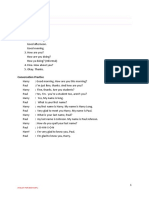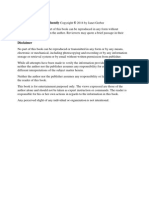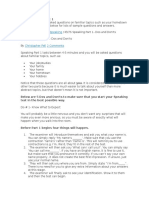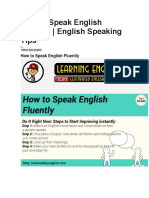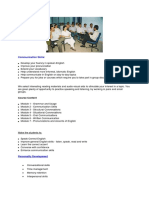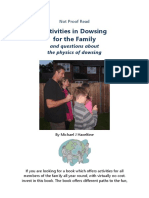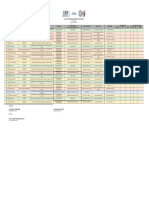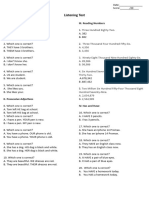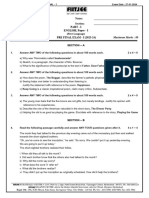Spoken English Easy Methods
Spoken English Easy Methods
Uploaded by
Uttara NagarjunaCopyright:
Available Formats
Spoken English Easy Methods
Spoken English Easy Methods
Uploaded by
Uttara NagarjunaOriginal Description:
Copyright
Available Formats
Share this document
Did you find this document useful?
Is this content inappropriate?
Copyright:
Available Formats
Spoken English Easy Methods
Spoken English Easy Methods
Uploaded by
Uttara NagarjunaCopyright:
Available Formats
http://www.talkenglish.
com/ExtraLessons/Speakin
gRules.aspx
5 Speaking Rules you need to know!
1. Don't study grammar too much
This rule might sound strange to many ESL students, but it is one of the most important rules. If you
want to pass examinations, then study grammar. However, if you want to become fluent in English,
then you should try to learn English without studying the grammar.
Studying grammar will only slow you down and confuse you. You will think about the rules when
creating sentences instead of naturally saying a sentence like a native. Remember that only a small
fraction of English speakers know more than 20% of all the grammar rules. Many ESL students know
more grammar than native speakers. I can confidently say this with experience. I am a native English
speaker, majored in English Literature, and have been teaching English for more than 10 years.
However, many of my students know more details about English grammar than I do. I can easily look
up the definition and apply it, but I don't know it off the top of my head.
I often ask my native English friends some grammar questions, and only a few of them know the
correct answer. However, they are fluent in English and can read, speak, listen, and communicate
effectively.
Do you want to be able to recite the definition of a causative verb, or do you want to be able to speak
English fluently?
2. Learn and study phrases
Many students learn vocabulary and try to put many words together to create a proper sentence. It
amazes me how many words some of my students know, but they cannot create a proper sentence. The
reason is because they didn't study phrases. When children learn a language, they learn both words and
phrases together. Likewise, you need to study and learn phrases.
If you know 1000 words, you might not be able to say one correct sentence. But if you know 1 phrase,
you can make hundreds of correct sentences. If you know 100 phrases, you will be surprised at how many
correct sentences you will be able to say. Finally, when you know only a 1000 phrases, you will be almost
a fluent English speaker.
The English Speaking Basics section is a great example of making numerous sentences with a single
phrase. So don't spend hours and hours learning many different words. Use that time to study phrases
instead and you will be closer to English fluency.
Don't translate
When you want to create an English sentence, do not translate the words from your Mother tongue. The
order of words is probably completely different and you will be both slow and incorrect by doing this.
Instead, learn phrases and sentences so you don't have to think about the words you are saying. It should
be automatic.
Another problem with translating is that you will be trying to incorporate grammar rules that you have
learned. Translating and thinking about the grammar to create English sentences is incorrect and should
be avoided.
3. Reading and Listening is NOT enough. Practice Speaking what you hear!
Reading, listening, and speaking are the most important aspects of any language. The same is true for
English. However, speaking is the only requirement to be fluent. It is normal for babies and children to
learn speaking first, become fluent, then start reading, then writing. So the natural order is listening,
speaking, reading, then writing.
First Problem
Isn't it strange that schools across the world teach reading first, then writing, then listening, and finally
speaking? Although it is different, the main reason is because when you learn a second language, you
need to read material to understand and learn it. So even though the natural order is listening, speaking,
reading, then writing, the order for ESL students is reading, listening, speaking, then writing.
Second Problem
The reason many people can read and listen is because that's all they practice. But in order to speak
English fluently, you need to practice speaking. Don't stop at the listening portion, and when you study,
don't just listen. Speak out loud the material you are listening to and practice what you hear. Practice
speaking out loud until your mouth and brain can do it without any effort. By doing so, you will be able to
speak English fluently.
4. Submerge yourself
Being able to speak a language is not related to how smart you are. Anyone can learn how to speak any
language. This is a proven fact by everyone in the world. Everyone can speak at least one language.
Whether you are intelligent, or lacking some brain power, you are able to speak one language.
This was achieved by being around that language at all times. In your country, you hear and speak your
language constantly. You will notice that many people who are good English speakers are the ones who
studied in an English speaking school. They can speak English not because they went to an English
speaking school, but because they had an environment where they can be around English speaking people
constantly.
There are also some people who study abroad and learn very little. That is because they went to an
English speaking school, but found friends from their own country and didn't practice English.
You don't have to go anywhere to become a fluent English speaker. You only need to surround yourself
with English. You can do this by making rules with your existing friends that you will only speak English.
You can also carry around an iPod and constantly listen to English sentences. As you can see, you can
achieve results by changing what your surroundings are. Submerge yourself in English and you will learn
several times faster.
TalkEnglish Offline Version is now ready for download. In this package, you can utilize over 8000 audio
files to completely surround yourself in English. There are over 13.5 hours of audio files that are not
available in the web form. All conversations and all sentences are included, so even if you don't have
many English speaking friends, you can constantly surround yourself in English using your MP3 player.
This package is available at the English Download page. Take advantage of this opportunity and start
learning English faster. Click on the link or go tohttp://www.talkenglish.com/english-download.aspx.
5. Study correct material
A common phrase that is incorrect is, "Practice makes perfect." This is far from the truth.
Practice only makes what you are practicing permanent. If you practice the incorrect sentence,
you will have perfected saying the sentence incorrectly. Therefore, it is important that you
study material that is commonly used by most people.
Another problem I see is that many students study the news. However, the language they
speak is more formal and the content they use is more political and not used in regular life. It
is important to understand what they are saying, but this is more of an advanced lesson that
should be studied after learning the fundamental basics of English.
Studying English with a friend who is not a native English speaker is both good and bad. You
should be aware of the pros and cons of speaking with a non native speaking friend. Practicing
with a non native person will give you practice. You can also motivate each other and point out
basic mistakes. But you might pick up bad habits from one another if you are not sure about
what are correct and incorrect sentences. So use these practice times as a time period to
practice the correct material you studied. Not to learn how to say a sentence.
In short, study English material that you can trust, that is commonly used, and that is correct.
Summary
These are the rules that will help you achieve your goal of speaking English fluently. All the
teachings and lessons on TalkEnglish.com follow this method so you have the tools you need to
achieve your goal right here on TalkEnglish.com.
English Speaking Basics - Section I
English Speaking Basics is for English speaking beginners who need help to understand the
basics of speaking English. We will use very simple phrases and expressions to help you with
your English speaking.
This first section contains the first 30 lessons. Go through them 1 by 1 until you are familiar
with each sentence.
1. Basic usage of 'I'm'
2. Variations of 'I'm in/at/on'
3. I'm good at
4. I'm + (verb)
5. I'm getting
6. I'm trying + (verb)
7. I'm gonna + (verb)
8. I have + (noun)
9. I have + (past participle)
10. I used to + (verb)
11. I have to + (verb)
12. I wanna + (verb)
13. I gotta + (verb)
14. I would like to + (verb)
15. I plan to + (verb)
16. I've decided to + (verb)
17. I was about to + (verb)
18. I didn't mean to + (verb)
19. I don't have time to + (verb)
20. I promise not to + (verb)
21. I'd rather + (verb)
22. I feel like + (verb-ing)
23. I can't help + (verb-ing)
24. I was busy + (verb-ing)
25. I'm not used to + (verb-ing)
26. I want you to + (verb)
27. I'm here to + (verb)
28. I have something + (verb)
29. I'm looking foward to
English Speaking Basics - Section II
English Speaking Basics II is for English speaking beginners who need help to understand the
basics of speaking English. We will use very simple phrases and expressions to help you with
your English speaking.
This second section contains the next 30 lessons. If any lessons are too easy, please move
forward to other lessons.
1. I'm calling to + (verb)
2. I'm working on + (noun)
3. I'm sorry to + (verb)
4. I'm thinking of + (verb-ing)
5. I'll help you + (verb)
6. I'm dying to + (verb)
7. It's my turn to + (verb)
8. It's hard for me to + (verb)
9. I'm having a hard time + (verb-ing)
10. I think I should + (verb)
11. I've heard that + (subject + verb)
12. It occurred to me that (subject + verb)
13. Let me + (verb)
14. Thank you for
15. Can I + (verb)
16. Can I get + (noun)
17. I'm not sure if (subject + verb)
18. Do you mind if I + (verb)
19. I don't know what to + (verb)
20. I should have + (past participle)
21. I wish I could + (verb)
22. You should + (verb)
23. You're supposed to + (verb)
24. You seem + (adjective)
25. You'd better + (verb)
26. Are you into + (noun)
27. Are you trying to + (verb)
28. Please + (verb)
29. Don't + (verb)
30. Do you like
English Speaking Basics - Section III
English Speaking Basics III is for English speaking beginners who need help to understand the
basics of speaking English. We will use very simple phrases and expressions to help you with
your English speaking.
This third section contains the next 30 lessons. Feel continue studying until you master each
lesson.
1. How often do you
2. Do you want me to + (verb)
3. What do you think about (verb-ing)
4. Why don't we + (verb)
5. It's too bad that
6. You could have + (past participle)
7. If I were you, I would + (verb)
8. It's gonna be + (adjective)
9. It looks like + (noun)
10. That's why + (subject + verb)
11. It's time to + (verb)
12. The point is that + (subject + verb)
13. How was + (noun)
14. How about + (verb-ing)
15. What if + (subject + verb)
16. How much does it cost to + (verb)
17. How come + (subject + verb)
18. What are the chances of + (verb-ing)
19. There is something wrong with + (noun)
20. Let's not + (verb)
21. Let's say that + (subject + verb)
22. There's no need to + (verb)
23. It takes + (time) + to + (verb)
24. Please make sure that + (subject + verb)
25. Here's to + (noun)
26. It's no use + (verb-ing)
27. There's no way + (subject + verb)
28. It's very kind of you to + (verb)
29. There's nothing + (subject) + can + (verb)
30. Rumor has it that + (subject + verb)
You might also like
- The English Fluency FormulaDocument46 pagesThe English Fluency Formulaabdulsamad96% (23)
- Go Natural English Ebook PDFDocument73 pagesGo Natural English Ebook PDFElmer López100% (11)
- Everyday English For Beginners 400 ActionsDocument47 pagesEveryday English For Beginners 400 ActionsRonei Batista100% (10)
- Final Exam Avanzado 4Document20 pagesFinal Exam Avanzado 4Sebastian Ruiz100% (4)
- Learn English in 30 DaysDocument62 pagesLearn English in 30 DaysHaroon Zafar100% (1)
- Do You Speak English Guide To Fluent EnglishDocument37 pagesDo You Speak English Guide To Fluent EnglishMohamed Khalid100% (14)
- Learn English With Movies PDFDocument5 pagesLearn English With Movies PDFlindsey fabellaNo ratings yet
- The 3-Month EnglishDocument24 pagesThe 3-Month English陳大慶100% (1)
- Let's Learn Speaking EnglishDocument7 pagesLet's Learn Speaking EnglishSuhanto Kastaredja50% (2)
- C.O.R.E. Success Workbook: Quality Impact Community IntegrityDocument34 pagesC.O.R.E. Success Workbook: Quality Impact Community IntegrityCarlos Diaz Acosta100% (1)
- English How To Speak English Fluently in 1 WeekDocument39 pagesEnglish How To Speak English Fluently in 1 WeekJamel Slimani100% (9)
- Top Tips For Learning EnglishDocument10 pagesTop Tips For Learning EnglishMorais Gomes JustinNo ratings yet
- How To Become A Fluent Speaker Ebook PDFDocument62 pagesHow To Become A Fluent Speaker Ebook PDFNgo Trung Vu50% (2)
- En - English Pronunciation GuideDocument16 pagesEn - English Pronunciation GuideIgor TavaresNo ratings yet
- 5 Speaking Rules You Need To KnowDocument4 pages5 Speaking Rules You Need To KnowTari SidaurukNo ratings yet
- Tips To Improve Your EnglishDocument25 pagesTips To Improve Your EnglishCristina Galvez100% (1)
- Test Your English AdultsDocument7 pagesTest Your English AdultsAna Frank KrstićNo ratings yet
- How To Learn English FastDocument17 pagesHow To Learn English Fastaman100% (2)
- The Idiom Connection PDFDocument16 pagesThe Idiom Connection PDFMaria Marrero100% (1)
- Frequently Used Sentences in EnglishDocument4 pagesFrequently Used Sentences in EnglishSuhanto Kastaredja50% (2)
- English Book 2019 PDFDocument47 pagesEnglish Book 2019 PDFJoselyn Johanna Saldaña SegoviaNo ratings yet
- 5 Keys To Fluency, LanguageDocument21 pages5 Keys To Fluency, Languagelukalu100% (2)
- How To Improve English Speaking SkillsDocument7 pagesHow To Improve English Speaking SkillsNikolina B.No ratings yet
- English Speaking For Beginner 1Document33 pagesEnglish Speaking For Beginner 1baso aslamin100% (2)
- My 30 Day English Challenge JourneyDocument13 pagesMy 30 Day English Challenge JourneyElla AtacadorNo ratings yet
- Speak Better EnglishDocument126 pagesSpeak Better EnglishSusanna Massetti100% (1)
- Talk Talk TalkDocument106 pagesTalk Talk Talkestadi100% (1)
- Daily ConversationDocument26 pagesDaily Conversationalvaro zherleeNo ratings yet
- Improve Your English v4 PDFDocument67 pagesImprove Your English v4 PDFattaoufikNo ratings yet
- Conversation English Idioms 2Document4 pagesConversation English Idioms 2Skype English School73% (11)
- How To Speak English FluentlyDocument39 pagesHow To Speak English FluentlyĐạo Nguyễn100% (1)
- Real English Manual 2.0Document13 pagesReal English Manual 2.0Harpak h.khani100% (2)
- English Pronunciation - With AUDIO - Part 6Document16 pagesEnglish Pronunciation - With AUDIO - Part 6بروف فى اللغة الإنجليزيةNo ratings yet
- Common Mistakes in EnglishDocument56 pagesCommon Mistakes in EnglishJAKELINE GRACE CASTAÑEDA CALDERONNo ratings yet
- Want To Speak Good EnglishDocument3 pagesWant To Speak Good Englishapi-3701809100% (1)
- IELTS Speaking InfoDocument40 pagesIELTS Speaking InfoGreenLake36No ratings yet
- English Conversation: Let's Get Start ItDocument8 pagesEnglish Conversation: Let's Get Start ItRodrigo BarbosaNo ratings yet
- Errors in English Among Arabic SpeakerDocument4 pagesErrors in English Among Arabic Speakermokta700rNo ratings yet
- Spoken English Laerning Quikly PDFDocument438 pagesSpoken English Laerning Quikly PDFJAWADNo ratings yet
- EnglishUp - Tips From Our TeachersDocument9 pagesEnglishUp - Tips From Our TeachersEnglishUp100% (2)
- English Communication Skills - NotesDocument23 pagesEnglish Communication Skills - Notesnajibjaafar67% (3)
- Basic Everyday English Course (For Elementary Level Students)Document107 pagesBasic Everyday English Course (For Elementary Level Students)Sharmaine Camille Modanza100% (3)
- GRAMMAR, Reading and WritingDocument6 pagesGRAMMAR, Reading and WritingAntioquia English67% (3)
- Course Outline: Instructor: Shanthi.GDocument32 pagesCourse Outline: Instructor: Shanthi.Galokfit100% (3)
- How To Speak English FluentlyDocument7 pagesHow To Speak English Fluentlygermanvip8100% (1)
- Verb Tense Overview With ExamplesDocument1 pageVerb Tense Overview With ExamplesAnonymous 7dHDP4jNo ratings yet
- 1 English Short Stories For Beginners,: WWW - Really-LearnDocument31 pages1 English Short Stories For Beginners,: WWW - Really-LearnPandora’s Box100% (1)
- English Lessons For BeginnersDocument2 pagesEnglish Lessons For BeginnersNesredin AbdiNo ratings yet
- Business English Keyword ResearchDocument42 pagesBusiness English Keyword ResearchDejan DabicNo ratings yet
- English Speaking BasicsDocument52 pagesEnglish Speaking BasicsMukesh Verma100% (2)
- English Beginner W12Document19 pagesEnglish Beginner W12Nhi Pham100% (1)
- English, English, EverywhereDocument44 pagesEnglish, English, EverywhereDesiYulindaNo ratings yet
- Education Conversation QuestionsDocument1 pageEducation Conversation QuestionsМария ЮжаковаNo ratings yet
- Spoken English in 10 DaysDocument20 pagesSpoken English in 10 DaysD R Voyage100% (1)
- Speak English in A WeekDocument32 pagesSpeak English in A Weekniroshnirosh100% (23)
- 700 Daily Spoken English DialougeDocument55 pages700 Daily Spoken English DialougeMd nishad100% (2)
- Basic English ConversationDocument11 pagesBasic English ConversationUkhtiy AfifahNo ratings yet
- Communication Skills:: Course ContentDocument2 pagesCommunication Skills:: Course ContentwiesukhihotuNo ratings yet
- 1000 SentenceDocument29 pages1000 Sentencehtdmdlp100% (1)
- 5 Speaking Rules You Need To KnowDocument3 pages5 Speaking Rules You Need To KnowEnglish CentralNo ratings yet
- English-5 Speaking Rules You Need To KnowDocument32 pagesEnglish-5 Speaking Rules You Need To KnowriyazudenNo ratings yet
- 5 Speaking Rules You Need To Know!: 1. Don't Study Grammar Too MuchDocument23 pages5 Speaking Rules You Need To Know!: 1. Don't Study Grammar Too Muchmuchlis rahmatNo ratings yet
- Activities in Dowsing For The Family PDFDocument128 pagesActivities in Dowsing For The Family PDFZach100% (1)
- What Is Art?: Definition of Arts According To Well-Known Philosophers and ArtistsDocument9 pagesWhat Is Art?: Definition of Arts According To Well-Known Philosophers and ArtistsScott Andrew SerranoNo ratings yet
- The Igorots: Distinctive Features of IgorotsDocument2 pagesThe Igorots: Distinctive Features of IgorotsAnnabelle DukaNo ratings yet
- Des 152 Thesis Candidates Bs Arch 5cDocument1 pageDes 152 Thesis Candidates Bs Arch 5cSijey TorresNo ratings yet
- KET Objective SB-P16 - 17Document2 pagesKET Objective SB-P16 - 17K60 Vũ Hoàng MiNo ratings yet
- Wozu DichterDocument13 pagesWozu DichterSean SturmNo ratings yet
- Title Country Sector First Name Last Name Organis Ation NameDocument4 pagesTitle Country Sector First Name Last Name Organis Ation NameSaravanan GNo ratings yet
- Human Resource Practices at DisneyDocument4 pagesHuman Resource Practices at DisneyHoài NhiNo ratings yet
- April DCDocument15 pagesApril DCAngamuthuNo ratings yet
- Basic-Verbs-Crossword-Puzzle-Crosswords - Solucionado DAIVER LOPEZ PADILDocument1 pageBasic-Verbs-Crossword-Puzzle-Crosswords - Solucionado DAIVER LOPEZ PADILDOCP INGENIERIAS0% (1)
- RPT English Year 4 (SK) 2024-2025Document13 pagesRPT English Year 4 (SK) 2024-2025Josephine 美珍100% (3)
- Rizal in BrusselsDocument13 pagesRizal in BrusselsZarina Kate Condoy100% (1)
- FILE 1A Multipack PDFDocument136 pagesFILE 1A Multipack PDFJavier Felipe Vilca Figueroa100% (20)
- Atividade 6 e 7 Ano-Países e NacionalidadesDocument2 pagesAtividade 6 e 7 Ano-Países e Nacionalidadeswilmaykom fontenele100% (4)
- PWRW1 01 06 B 08Document1 pagePWRW1 01 06 B 08maryamqureshuiNo ratings yet
- Grade 6-Listening TestDocument2 pagesGrade 6-Listening TestRed FuentesNo ratings yet
- European Runes Oldest Writing in HistoryDocument2 pagesEuropean Runes Oldest Writing in HistoryrykhartNo ratings yet
- 31-03-2023 Sed TicketsDocument10 pages31-03-2023 Sed TicketssureshhkNo ratings yet
- Session 2 English V 2020-01Document21 pagesSession 2 English V 2020-01Jefferson Choquenaira AlvarezNo ratings yet
- First Year Eng Pf-I Ex. Dt. 27-01-2024 Q.PDocument4 pagesFirst Year Eng Pf-I Ex. Dt. 27-01-2024 Q.PyeshvithathotaNo ratings yet
- Legacy of Arabic Loanwords in EnglishDocument5 pagesLegacy of Arabic Loanwords in Englishalsalahia005No ratings yet
- 3i-Module 4 Lesson 1Document21 pages3i-Module 4 Lesson 1colaNo ratings yet
- Activist Archives by Doreen LeeDocument39 pagesActivist Archives by Doreen LeeDuke University Press100% (2)
- English Plus 8 Lesson PlanDocument64 pagesEnglish Plus 8 Lesson PlanTEMIRBULATOVICHNo ratings yet
- Kyōiku Kanji (Document45 pagesKyōiku Kanji (Distant SmokeNo ratings yet
- Wolfram Wilss - Translation and Interpreting in The 20th Century - Focus On German (1999, John Benjamins Publishing Company) - Libgen - LiDocument271 pagesWolfram Wilss - Translation and Interpreting in The 20th Century - Focus On German (1999, John Benjamins Publishing Company) - Libgen - LiRafika ZahraNo ratings yet
- Grade 4 TIMETABLE AND PORTION FOR 2020 - 2021Document3 pagesGrade 4 TIMETABLE AND PORTION FOR 2020 - 2021Nirvaan DhodiNo ratings yet
- Result Science Model Test VDocument20 pagesResult Science Model Test Vabhinavdhungana7No ratings yet























